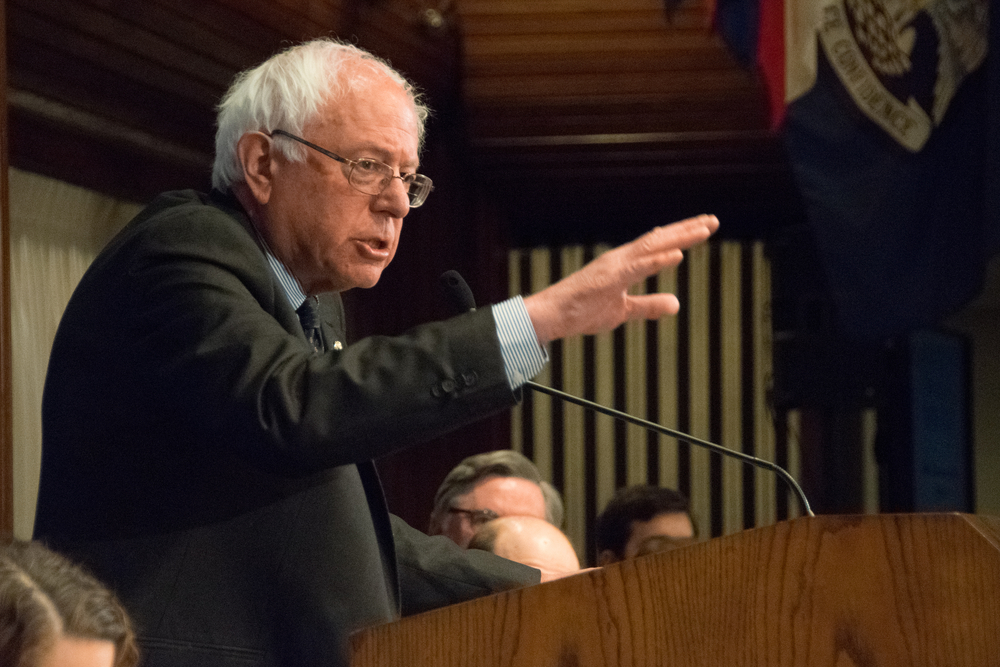by Kate Kizer and Laila Ujayli
On Wednesday morning, Senator Bernie Sanders (I-VT) took to the Senate floor and announced that he and his colleagues would soon be voting on one of the most serious foreign policy issues in some time. Thanks to Senator Sanders, and his colleagues Mike Lee (R-UT) and Chris Murphy (D-CT), Congress will weigh ending U.S. support of the Saudi-led war in Yemen that has killed thousands of civilians and driven millions to the brink of famine.
Faced with overwhelming public pressure and polling showing a majority of Americans want an end to U.S. participation in the war in Yemen, the Senate finally said enough as 63 senators voted to advance S.J. Res. 54. This vote was clearly a stern rebuke of Donald Trump’s position on Saudi Arabia and his refusal to hold Crown Prince Mohammed bin Salman (MbS) accountable for the brutal murder of Washington Post contributor Jamal Khashoggi. But this historic vote isn’t just about the anger of 63 senators and a rebuke of Trump. It’s about signaling to Saudi Arabia, the United Arab Emirates, and their allies that if the administration won’t act to end the war in Yemen, Congress will.
Jamal Khashoggi gave a public face to Saudi brutality that had long been on display in Yemen’s war. Today in Yemen, 14 million people are at risk of starving to death if the status quo continues. Sarah Margon, Washington director of Human Rights Watch, has emphasized, “Yemen could be facing the worst famine in 100 years if the conflict does not end [and] if the economy collapses, which we take very seriously and see as a strong likelihood if the situation persists.” Humanitarian organizations are urging the United States to end its assistance to the Saudi-led coalition or otherwise share the blame for mass famine. But efforts to alleviate Yemen’s humanitarian suffering have largely stalled, in large part due to the Saudi-led coalition’s continued bombardment and blockade of Yemen’s cities and the Trump administration’s message that it won’t take punitive action to end the coalition’s escalation.
For all of the Trump administration’s rhetoric about the need to end the war, the only way to achieve this goal is by ending the Saudi-led intervention. And without U.S. support, the Saudi-led coalition would lose significant legitimacy and the resources required to wage its intervention indefinitely, forcing Saudi Arabia, the UAE, and its proxies to come to the table to negotiate. That’s one reason why the Senate’s vote and upcoming votes are so critical. Congress has decided to hold the administration to its rhetorical support for an end to the war and invoke the military leverage the administration has been so loathe to use.
Indeed, leading up to the Senate vote, the administration came out in full force to defend business-as-usual with Saudi Arabia. Secretary of State Mike Pompeo and Defense Secretary Jim Mattis led the charge, briefing the Senate and releasing remarks replete with falsehoods. For instance, they wrongly claimed that a U.S. drawdown from Yemen would empower Iran and extremist groups when the reverse is actually the case. The White House even reportedly prevented CIA Director Gina Haspel from testifying to the CIA’s assessment that MbS ordered Khashoggi’s murder during a Senate briefing on Saudi Arabia, a transparent cover-up to dissuade senators from acting to censure the crown prince.
The Senate refused to listen. By advancing S.J. Res. 54, it sent a clear message to MbS that his ability to continue the status quo in Yemen with U.S. support is approaching its expiration date. The vote erodes the legitimacy granted to the Saudi-led coalition when they began their intervention in March 2015. And contrary to Mattis and Pompeo’s assertions, withdrawing U.S. support from the Saudi-led coalition will not derail upcoming peace talks. Rather, it will force Saudi Arabia and its allies to make a real effort to end the war because the U.S. military and political support the kingdom relies on is no longer guaranteed.
This week, the Senate will continue in its long-overdue debate on the war in Yemen and reassert its congressional war-making authority. Yet more remains to be done to actually achieve the senators’ stated goal of ultimately ending the war in Yemen. The public pressure that led to the Senate’s action on S.J. Res. 54 must now continue, with a final vote in the Senate and a comparable debate in the House of Representatives. The United States must finally cease all material and logistical support for the Saudi-led coalition and focus on bringing diplomatic pressure to bear to end this devastating war by supporting inclusive peace talks in December. As Sen. Sanders rightly said this week, “Enough death. Enough killing. Enough destruction.” Yemen can no longer wait.
Laila Ujayli is a Herbert Scoville Jr. Peace Fellow at Win Without War. A Syrian-American, she specializes in the human impact of U.S. foreign policy in the Middle East. Follow her on Twitter @lailaujayli.





